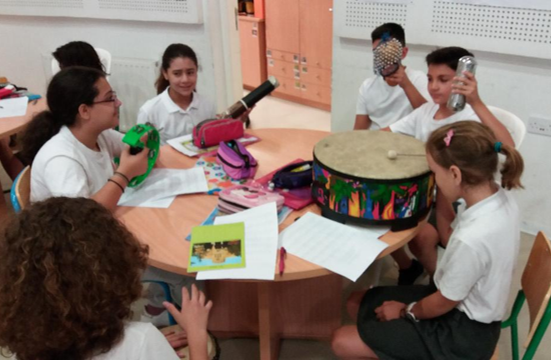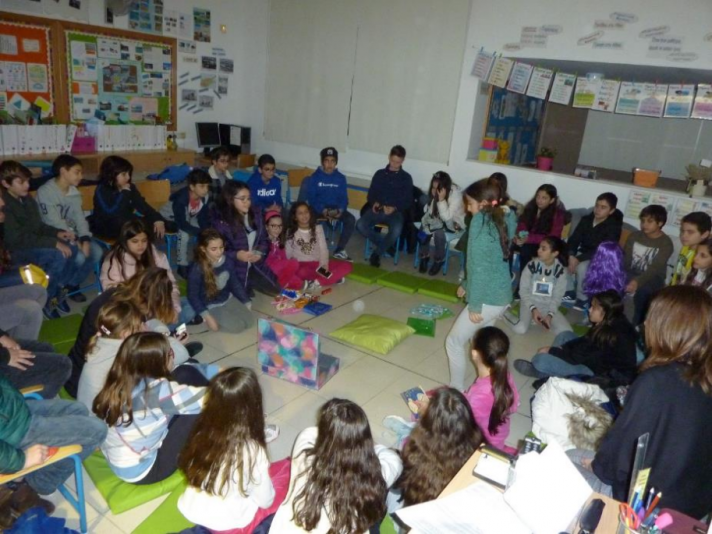Topic(s) addressed
Poor reading performance, coupled with a general disinterest in reading, carry long-term consequences for both individuals and society at large. As such, the Erasmus+/KA2 project “The Living Book,’ was designed in order to address underachievement in reading skills among European students between the age of 9-15, within which the overall approach to literature and innovative ways to teaching were engaged in order to address this issue. Teachers from participating schools were expected to be inventive, and use easily-accessible applications in order to design lesson plans that incorporate the use of augmented reality, and which transform literature classes into creative, technologically-enhanced learning groups that ultimately motivate students’ reading habits and promote their interest in literature.
Target groups
One of the project’s target groups was Makedonitissa 3 Primary School – Stylianou Lena, from which approximately 180 students between the ages of 9-12 had the opportunity to participate in the project throughout its 3-year duration (Sept. 2016-Aug. 2019). Students were native speakers of Greek, and were largely from middle or high socioeconomic backgrounds. Only half the teaching staff (15/30) was actively involved in the project, with remaining teachers having expressed an interest for the ‘Living Book’ approach and the future implementation of its innovative methods.
Methodologies
According to the guidelines set out by the ‘Living Book’ approach, enhanced reading is based on the reader’s independent research, selection, production, and remix of content, which enhances their reading experience through an exploration of references and possibilities presented by the text, and which connects the text to the reader’s world of experiences and interests. Based on these guidelines, interdisciplinary lesson plans were developed by the school, with teachers having collaborated on the promotion of enhanced or augmented reading for all students (including those from disadvantaged socio-economic backgrounds, with disabilities [SEN], or other educational needs) through the use of reading tools and methods. The project’s learning outcome, which focused largely on both reading comprehension and creative writing, enhanced students’ digital competence through the use of mobile devices and apps, with the aim of increasing their interest in book reading while promoting lifelong reading habits. The school, which has wireless Internet connection and a well-equipped computer lab, provided students with mobile devices on a 1:1 basis. As a result, all student participants were able to familiarise themselves with new applications (i.e., Padlet, Kahoot, Quiver, QR Code Creator, HP Reveal) and online software (Storyboard That, Google Maps, Tour Builder). In developing their digital competence, students worked across curricula and attempted to enhance the books they were reading in various ways; this included the creation of QR codes or Auras that connected the text with a relevant web video, enrichment of the text through the use of new dialogues that were presented as comic strips, and cooperative work towards the development of a Padlet wall on which book-related information could be shared. Older students were able to gradually utilise their Green-screen app to enliven book or dialogue scenes and embed their videos into their books through the use of QR codes. Mobile devices’ camera and audio recording functions were also extensively used, particularly in the recording of sounds that were created during music lessons to accompany texts. Furthermore, students made recordings of themselves as they read the book (which was then digitally embedded within book chapters) so they may be used either by students with limited reading skills, or younger children, who may choose to listen to the book instead of reading it. Pictures were also taken of artefacts that were created during art lessons, which were then inserted into the book using a QR code so as to augment its contents. Within the scope of this project, both comprehension and writing were not considered to be primary components of enhanced reading, instead, the project’s ‘multicodical’ environment forwards the use of audio, music, images, videos, and interactive content as relevant and useful components that enrich students’ reading experience, and which further enhance the digital skills they have acquired through informal, everyday interactions with digital devices.
Environments
Teachers had to be, first and foremost, trained in the ‘Living Book’ method. To this end, the European University of Cyprus (the project coordinator) employed a blended learning approach in its teaching of the method’s essential modules to teachers. Over the course of the project, teachers (functioning as researchers) identified several useful web tools that they applied on their students, and which yielded interesting results. Repeated Living Book dissemination conferences, multiplier events, and teacher-training seminars were organised either by the European University of Cyprus or the Cyprus Pedagogical Institute (in cooperation with the school), which helped secure Makedonitissa 3 Primary School- Stylianou Lena’s position as a leader in the effective use of innovative teaching and learning approaches. Moreover, teachers from nearby schools visited the school in order to sit in during lessons and gain expertise from teachers who participated in the project, so they may implement similar strategies in their respective schools.
Teachers
Substantial advantages resulted from teacher cooperation and their exchange of information (either on site or remotely) on the Living Book method. Furthermore, its use of innovative teaching approaches and the inclusion of new technologies into the classroom setting enriched teachers’ creativity and flexibility in their provision of unique lessons that engage student learning and which maximise learning outcomes.
Impact
Teachers and students who were involved with the project managed to enrich their digital skills and learn new ways of using technology; teachers acquired valuable knowledge and skills in the design of innovative lesson plans, while students were exposed to fun and interesting outcomes based on individual learning processes. Lastly, teachers used ‘scaffolding’ strategies to progressively improve student autonomy across reading-related activities.
- Reference
- 2016-1-CY01-KA201-017315
- Project locations
- Cyprus
- Project category
- Primary education
- Project year
- 2021
Stakeholders
Participants
Agrupamento de escolas du Vila Nova de Paiv
- Address
- Portugal
Comune di Vicenza
- Address
- Italy
Dimotiko Scholeio Makedonitissas 3- Stylianou Lena
- Address
- Cyprus
Forum del Libro
- Address
- Italy
GRYD LTD
- Address
- United Kingdom
Şcoala Gimnazială „Constantin Parfene”
- Address
- Romania
Tartu Kivilinna Kool
- Address
- Estonia
Universidade da Beira Interior
- Address
- Portugal


